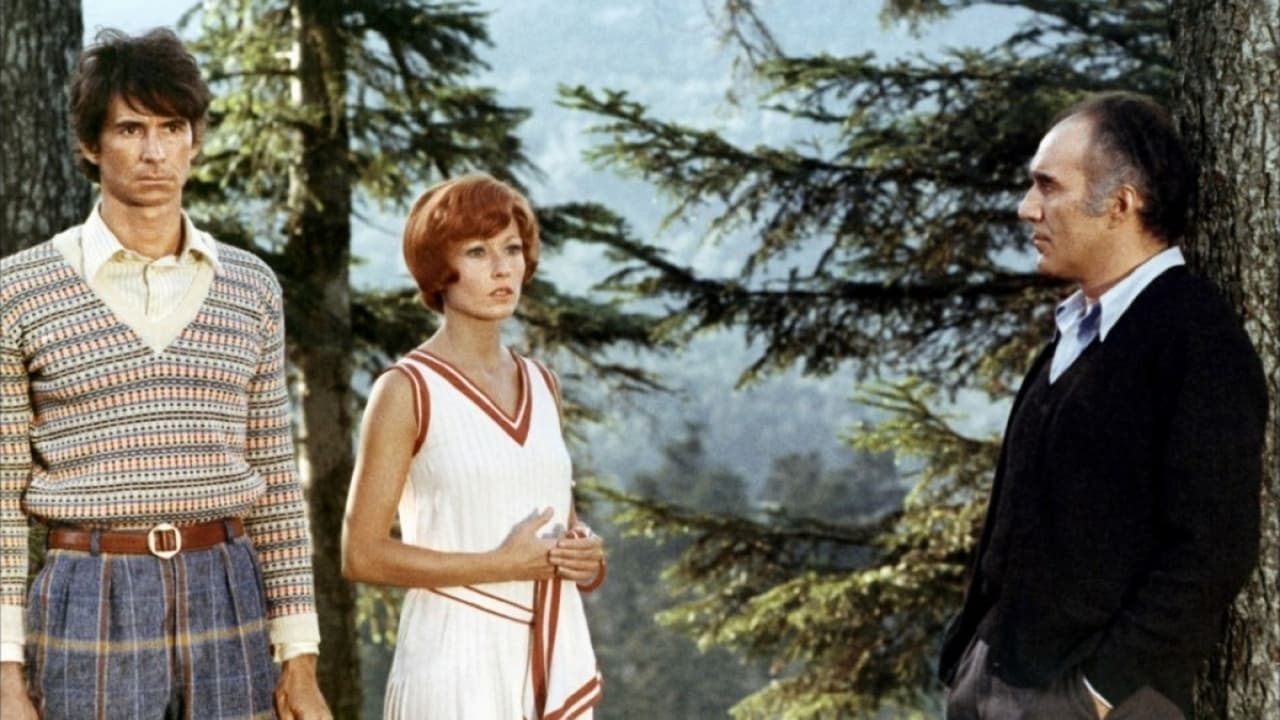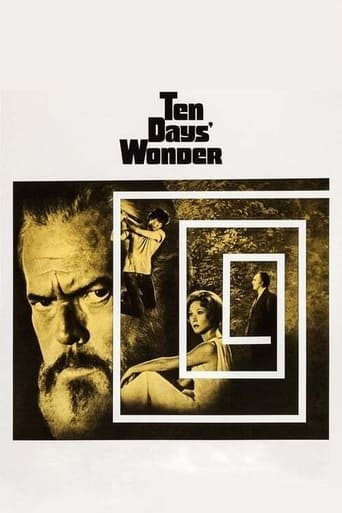dbdumonteil
All comments bar one are very negative ,no one mentions writer Ellery Queen,those two cousins who gave some of the best murder mysteries of the twentieth century.Theirs is the metaphysical detective story (Borges admired Ellery Queen),theirs is the unexpected final clue ,theirs is the "nursery chryme" dear to Agatha Christie .Some of their novels are on a level with "And then there were none" .All Ellery Queen novels feature Ellery Queen himself as the detective .Here he is replaced by Michel Piccoli's character ,Paul Régis,which is not a big problem.But the problem lies in the fact that most of the viewers did not recognize "their "Claude Chabrol.If they knew his numerous works ,they'd realize that only a dozen (roughly ,the 1959-1961 ,the 1967-73 golden era and some scattered later films (l'enfer,la ceremonie) are really Chabrolesque ,that is to say detective plot-with- bourgeois background-and ominous atmosphere.There are plenty of bizarre oeuvres in such a huge filmography (a lot of movies should never have been made;Clouzot,who easily artistically surpasses him only made 11 movies,only one of which is mediocre).Actually " decade " took the eerie elements of "la rupture"(1970) and tightened them up.But whereas "La rupture" had a chabrolesque atmosphere and the usual suspects (Stephane Audran,Michel Bouquet),"Decade" features actors Chabrol had not used before (and to my knowledge never would).Coming after "juste avant la Nuit" ,"decade" could only be slagged off when it was released.Today,I must confess that it's not that much bad and compared with recent fiascos such as "la Fleur du Mal" or "au Coeur du Mensonge " or "rien ne va plus" or.... (the list is endless)it retains some originality.I can easily comprehend that people who do not know E.Queen 's world could be infuriated by this Punch and Judy style,but Chabrol faithfully transferred the writer's atmosphere to the screen :the gigantic metaphysical metaphor,a nervous Anthony Perkins -a good choice- ,a enough is enough Orson Welles-who else?- ,God himself.Do not get me wrong:"decade " is no masterpiece but it is a curious offbeat work ,sometimes clumsy (Chabrol felt compelled to "explain" the last scenes for fear his audience may not have understood),sometimes brilliant (the little girl in the train reciting the ten commandments )."Decade" verges on fantastic and predates another non-Chabrolesque intriguing flick "Alice ou la dernière fugue" .I have a warm spot in my heart for these two despised films ."Decade" : a failed success or a successful failure ?And if you hate it (such is the case with many users) it's better than to be unconcerned about it.
alice liddell
One of the great anti-detective films of the 60s and 70s (such as THE SPIDER'S STRATEGEM, BLOW-UP, THE PARALLAX VIEW) in which the traditional, detached, problem-solving power of the detective is removed and he finds himself lost in a labyrinth. The detective here, Paul Regis, is so much the embodiment of reason that he is a professor of philosophy. He observes, analyses, seeks patterns in a bewildering maze - his genius results in the suicidal death of the wrongfully suspected hero.The film opens as a young sculptor, Charles Van Horn (Anthony Perkins), wakes up, hands bloodied, mind disoriented, thinking of ocean-deep life, in a hotel. He has no idea how he got there, and Chabrol visualises his disturbed mind with extreme tilted angles and harrowing electronic music. He calls the only person he knows in the area, an old lecturer of his, Paul Regis (Michel Piccoli), and asks him to visit his home, a vast provincial mansion presided over by his bulky, Americanised father Theo, played with a lovely mixture of melancholy and play by Orson Welles, and his pretty young wife, Helene (Marlene Jobert).Beneath the bourgeois facade, Paul finds an almost Gothic seething of adultery, power games, mad old ladies, blackmail, theft, Oedipal trauma. Charles and Helene have begun an illicit relationship, and are being blackmailed. Charles steals the money from Theo, and both parties enlist Paul to spy on the other. Paul finds his detachment, however, increasingly compromised, and in the climactic 'revelation' scene, all fingers point at him.This film is based on an Ellery Queen novel, exemplar of all that is lucid and simplistic about the detective genre, in which complex plotting is always framed in such a way as to be accessible to the reader, so he can have a go at playing detective himself. They follow the usual formulae: crime-investigation-solution; disruption-reassertion of order.Chabrol's film is Ellery Queen written by Borges. It subverts every tenet of the genre in a myriad of ways. Although the traditional crime film is deliberately artificial, it depends on a surface realism (plausible settings and outwardly recognisable characters) to succeed. Chabrol foregrounds his material's gleeful playfulness at every turn. The viewer is never allowed to lose himself in the plot; the elaborate, disruptive camera movements; the intrusion of decor into the plot; the wild playing with time and point of view; the 'amateurish', unrealistic acting and stilted dialogue; the wayward plotting all point up the artifice and unbelievability of the film, the sense of a godlike puppetmaster pulling strings. This sense is crucial to the story, when the narrative puppetmaster (Theo) is linked directly to the camera, i.e. the director (Theo's wife bears a remarkable resemblance to Chabrol's wife, Stephane Audran).This foregrounding of artifice reverberates throughout the film, which creates an opposition between creators (Theo, Charles) and interpreters (Paul). This is linked to the traditional crime story - someone 'creates' a crime that must be interpreted by the detective. This kind of pattern, however, suggests a social order in which reality can be known, ordered and controlled. Chabrol suggests that this is not the case.
He shows the unknowability in many ways. The film is set in a rarefied space away from the 'real' world, which is also a fantasy set where Theo plays out his dreams of 20s grandeur. Much of the plot is related by characters whose reliability is seriously in doubt from the start. WONDER starts with Charles emerging from a dream, and the film never loses this sense of the oneiric. Scenes repeat themselves as characters are lost in a maze, literally so, with all the repeated corridors and stairs in the film, the profusion of mirrors and windows that reflect back or multiply meanings, the decor that constantly dwarfs the characters.WONDER is about play, but also quotes from a famous play, Oedipus Rex, which is among other things the first detective story. Charles sleeps with his mother, Helene, and tries to destroy his father. This founding human myth is countered by the father with Christian patterning (in a way that foreshadows SEVEN); both cancel each other out, one is left with neither catharsis nor redemption. But Oedipus was both detective and criminal, andso is Paul (Theo says he is guiltier than him). Images of sight and blindness pervade the film (linked in a very real way to the cinema), and the final 'revelation' is lit by a lamp half Atlas, half eye. But the detective is truly blind, trying like Holmes to fix patterns in the abyss, revealing that abyss as he fails to do so, carelessly costing lives. There is, ironically, no death, UNTIL the detective makes his judgement, rather than the other way round.The film is also a brilliant family saga, the country house a site for all manner of generational psychodramas (the paedophiliac implications of Theo's and Helene's marriage are chilling). But there are Oedipal struggles too, and the apparent artifice masks a very personal Chabrol film. His casting is very deliberate, with Welles playing a self-destructive KANE figure, playing God through kindness; Perkins invoking both PSYCHO (and the Hitch suggestions are both brilliantly misleading (we're all looking at the mother!) and enriching (the 'innocent' wrongfully accused; the Catholic depths; the famed concept of transferring guilt), and the (Welles-directed) THE TRIAL; Piccoli (veteran of bourgeois bashers Bunuel and Godard, as well as a link, through LE MEPRIS, to Chabrol hero Lang).The film is remarkably perspicacious about class and money (the 'God' figure is a poor Frenchman who made his fortune in America) - and the country house is used in its double metaphor for both the state at large and the mind. Amid all the sterile, despairing , destructive, man-made constructs, Chabrol has never lost his beautiful sympathy with the French countryside. This is one of a series of stunning thrillers made by Chabrol in the late 60s/early 70s that blow apart the conservatism of the genre.

